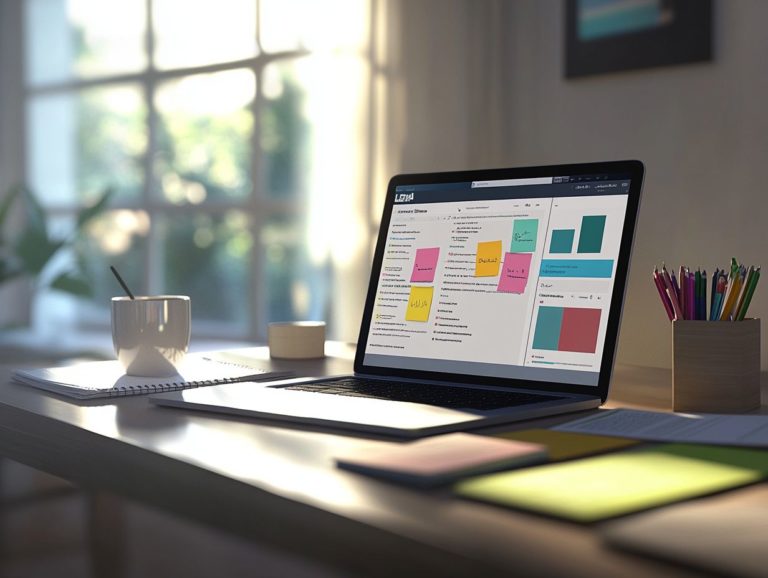Implementing CRM for B2B vs. B2C
In today s fast-paced business landscape, Customer Relationship Management (CRM) helps businesses manage their interactions with customers. It has become essential for both B2B and B2C companies.
While the core purpose of CRM is to enhance customer relationships, the strategies and practices you employ will differ significantly between these two markets. Let s explore the unique needs of B2B and B2C CRM together!
This article provides insights into effective implementation strategies, common challenges, and methods to measure success.
Whether you run a small startup or a large corporation, grasping these distinctions enables you to tailor your approach for maximum impact.
Contents
- Key Takeaways:
- Key Differences Between B2B and B2C CRM
- Implementing CRM for B2B
- Implementing CRM for B2C
- Common Challenges in CRM Implementation
- Measuring Success in CRM
- Frequently Asked Questions
- What is the main difference between implementing CRM for B2B and B2C businesses?
- What are the key factors to consider when implementing CRM for B2B businesses?
- What are the key factors to consider when implementing CRM for B2C businesses?
- What are some common challenges businesses face when implementing CRM for B2B vs. B2C?
- Should businesses use the same CRM system for B2B and B2C purposes?
- What are some best practices for implementing CRM for B2B and B2C businesses?
Key Takeaways:

- Effective CRM implementation requires understanding unique market needs.
- B2B CRM focuses on strong relationships with key decision-makers.
- B2C CRM aims for personalized experiences for a wider audience.
- Measure success with customer satisfaction and retention metrics.
Defining CRM and its Benefits
CRM is your digital ally, enabling you to manage interactions and relationships with both potential and current customers. It ensures that every touchpoint be it sales, marketing, or customer service is refined through automation and effective communication.
With CRM software like Salesforce, HubSpot, Microsoft Dynamics 365, SAP Sales Cloud, and Pipeliner at your disposal, you ll find these tools critical for streamlining the necessary paperwork involved in managing these interactions. This not only enhances your business processes but also cultivates long-lasting relationships.
By consolidating all customer data into a unified platform, CRM allows you to uncover invaluable insights into customer behavior and preferences. This holistic view enables you to tailor your communications, fostering a deeper connection and trust with your clients.
Key features such as lead tracking, sales forecasting, and robust reporting tools work together to streamline your operations. This boosts your sales performance while also bolstering customer loyalty across both B2B and B2C markets.
Ultimately, a well-implemented CRM system transforms data into actionable strategies. It ensures that building and nurturing strong customer relationships becomes a seamless and impactful endeavor.
Key Differences Between B2B and B2C CRM
Grasping the essential distinctions between B2B (Business to Business) and B2C (Business to Consumer) CRM systems is crucial for enhancing customer interactions and refining your marketing strategies.
In B2B, you ll encounter more intricate buying processes and longer sales processes, contrasting sharply with the more straightforward purchasing behaviors prevalent in B2C settings.
Understanding these nuances enables you to optimize your approach effectively.
Understanding the Unique Needs of Each Market
The unique needs of B2B and B2C markets profoundly shape how you communicate with clients, manage interactions, and create personalized offers. In the B2B realm, the emphasis often lies on cultivating long-term relationships and navigating complex purchasing behaviors.
Meanwhile, B2C focuses more on meeting immediate consumer needs and ensuring transactional efficiency.
In B2B environments, you often find that clients require comprehensive product information think detailed specifications, case studies, and testimonials to guide their significant investment decisions. This calls for a nuanced understanding of customer relationships, as building trust through transparency and expertise becomes paramount.
On the flip side, B2C consumers are all about convenience and quick purchasing options. They favor user-friendly interfaces and rapid access to products, which compels businesses like yours to devise effective marketing strategies that streamline the buying process.
By grasping these differing expectations, you can develop tailored approaches that not only nurture relationships but also enhance customer satisfaction and drive sales in both arenas.
Implementing CRM for B2B

Implementing CRM in B2B environments requires a strategic approach that emphasizes lead management, customer journey mapping, and enhancing sales performance.
By using tailored CRM software solutions, you can streamline complex buying processes. This fosters improved customer relationships and helps you understand purchasing behavior. Additionally, it offers valuable insights into emerging trends, ensuring you stay ahead in a competitive landscape.
Strategies and Best Practices
Adopting effective strategies and best practices in your B2B CRM implementation can significantly enhance your process automation. It also optimizes CRM system features and aligns your marketing strategies with business objectives.
This approach ultimately drives customer satisfaction and loyalty.
Using predictive analytics is crucial to enhance these efforts. It allows you to target prospects with precision, enabling your business to anticipate customer needs and tailor offerings accordingly.
Effective customer segmentation enables you to categorize your clientele based on specific behaviors and preferences. This ensures that your marketing messages resonate deeply. When combined with seamless direct payment options and efficient delivery mechanisms, these strategies create an environment where customers feel valued and understood.
In the end, implementing such practices solidifies long-term relationships and significantly boosts sales performance. This ensures you maintain a sustainable competitive edge in the marketplace.
Implementing CRM for B2C
Implementing CRM for B2C necessitates a deep understanding of customer segmentation and purchasing behavior. This insight empowers you to use CRM software effectively, enhancing communication with your clients, personalizing offers, and refining the customer journey.
This approach can skyrocket your sales conversion rates and provide a more satisfying experience for your customers.
Strategies and Best Practices
To optimize your B2C CRM implementation, it’s essential to adopt strategies that emphasize effective marketing techniques. Harnessing CRM software features tailored for fast-paced sales cycles and immediate customer engagement is key.
By using real-time analytics, you gain instant insights into customer behaviors and preferences. This allows you to craft your strategies with precision, facilitating targeted marketing campaigns that truly resonate with your audience’s unique needs.
Utilizing customer data enhances personalization and strengthens communication between your brand and its customers. Maintaining these relationships is crucial; it cultivates loyalty and encourages repeat purchases, ultimately driving profitability in an increasingly competitive marketplace.
Common Challenges in CRM Implementation

Despite the benefits, common challenges can hinder CRM implementation. This is especially true in complex B2B and fast-paced B2C environments, where lead management and data integration play crucial roles.
Addressing Issues in B2B and B2C Scenarios
Addressing the unique challenges in B2B and B2C CRM scenarios requires tailored strategies that consider the specific dynamics of customer relationships and purchasing behavior.
In B2B contexts, you often face hurdles like managing lengthy sales cycles and maintaining personalized communication with multiple stakeholders involved in the decision-making process. Effective CRM software can streamline communication and automate follow-ups, ensuring that all leads are nurtured efficiently.
For example, by utilizing tools that segment leads based on their engagement level, you can focus your marketing efforts more precisely.
In B2C environments, however, brands grapple with understanding customer preferences and responding swiftly to their needs. Implementing CRM systems that track customer interactions and purchase histories can lead to more impactful personalized marketing, fostering stronger customer relationships.
Both scenarios highlight the essential need for integrated solutions that not only enhance communication but also drive meaningful engagement.
Ready to elevate your CRM strategies? Start implementing these best practices today!
Measuring Success in CRM
To measure success in CRM, identify key metrics that show how effective your customer interactions are. Knowing how CRM software impacts sales helps refine your approach.
This strategy allows you to adapt and enhance your methods based on changing customer needs.
Key Metrics and Tools for Tracking Progress
Tracking your progress in CRM initiatives is essential for better managing customer data and understanding sales performance and marketing effectiveness.
Utilize specialized analytics software and user-friendly dashboards to access real-time data that reveals customer patterns, preferences, and engagement levels.
These technologies help you gather diverse data points, interpret key performance indicators, and measure the effectiveness of your CRM efforts.
By focusing on these metrics, you can identify improvement areas in customer interactions, leading to tailored marketing strategies that resonate with your audience.
This deeper understanding fosters stronger customer connections, enabling personalized experiences that enhance satisfaction and loyalty.
Frequently Asked Questions

What is the main difference between implementing CRM for B2B and B2C businesses?
The main difference in implementing CRM for B2B and B2C lies in the target audience. B2B businesses sell to other businesses, while B2C businesses sell directly to consumers. This distinction affects the CRM strategies and tools used, highlighting the importance of CRM in B2B.
What are the key factors to consider when implementing CRM for B2B businesses?
In B2B, consider the sales cycle length, sales process complexity, number of decision-makers, and business relationships. These factors influence the most effective CRM system and features.
What are the key factors to consider when implementing CRM for B2C businesses?
B2C businesses should focus on customer data volume, touchpoints throughout the customer journey, and personalization needs. A CRM system with robust data management and segmentation is crucial due to the larger customer base.
What are some common challenges businesses face when implementing CRM for B2B vs. B2C?
Common challenges include data organization, user adoption, and balancing automation with personalization. B2B businesses may struggle with client CRM alignment, while B2C businesses face challenges in managing extensive customer data.
Should businesses use the same CRM system for B2B and B2C purposes?
Using the same CRM for both B2B and B2C is generally not advisable. Each business type has unique needs and goals, making a one-size-fits-all approach ineffective. Choose a CRM tailored to your specific requirements.
What are some best practices for implementing CRM for B2B and B2C businesses?
Best practices include defining clear goals, involving relevant departments, training staff effectively, and regularly reviewing your CRM strategy. Opt for a user-friendly, customizable, and scalable CRM system to accommodate future growth.






